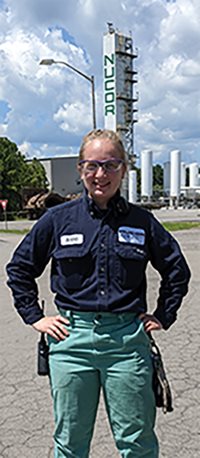 Anna R. Carnahan – 2022 Steel Intern Scholar
Anna R. Carnahan – 2022 Steel Intern ScholarNucor Steel–Hertford County gave me the opportunity to work as a metallurgist intern this summer. As an intern I was exposed to many aspects of steelmaking and he foundation and culture of Nucor: safety. The team is constantly challenging themselves to be one of the safest steel companies in the world by watching out for each other so everyone can leave work the same way we came to work.
Nucor’s emphasis on safety has impacted my summer because it has challenged me to find ways to improve safety in the mill. As I first walked through the mill, I noticed many overhead cranes in the melt shop were hard to identify making it difficult to contact the operator. I then decided to work with the team to improve the labeling of overhead cranes by adding additional numbering to the cranes. These labels — when applied — will make it easier for teammates to identify cranes in the area and communicate with the operator. With my safety project in process, I focused on my primary project: improving Nucor Steel–Hertford County’s steel cleanliness initiatives on low silicon steels. Clean steel improves yield, quality, and castability which requires inclusion control. Inclusions are nonmetallic particles that generally remain solid at steel making temperatures. These particles cause clogs to happen when casting but can be modified to increase castability. For my project, I used a LECO oxygen nitrogen analyzer to try and build a baseline for clean steel at the LMF. I studied the total oxygen content of the steel sample, the steel chemistry and slag chemistry. I was able to collaborate with Nucor Steel–Berkeley to run automated feature analysis (AFA) on several of my samples. This analysis showed me our current inclusion modification and helped me to verify NSHC’s steel cleanliness practices. In addition to using the LECO and running AFA, I used an x-ray florescence (XRF) machine to analyze the chemistry of slags. Slag visually and quantitatively can inform the operator about the reactions occurring at the LMF. Although my project did not end the how I anticipated, I did learn more about the steel making process at NSHC and the many factors that impact steel cleanliness.Some of my favorite experiences while working at Nucor Steel–Hertford County were Wednesday evening intern volleyball games, learning how to weld, attending Nucor’s Intern Summit in S.C., USA, and exploring a variety of different mill locations and departments. Volleyball games taught me patience and teamwork, the intern summit showed me a different Nucor product line and mill, gave me the opportunity to collaborate on my steel cleanliness project with other Nucor interns, and learn how to manage and run a steel mill. Finally, my experience exploring the mill site gave me a wholistic view of the steel making process, encouraged me to be a better environmental steward, and opened a door of opportunity for me to grow as a materials science engineer.
With my safety project in process, I focused on my primary project: improving Nucor Steel–Hertford County’s steel cleanliness initiatives on low silicon steels. Clean steel improves yield, quality, and castability which requires inclusion control. Inclusions are nonmetallic particles that generally remain solid at steel making temperatures. These particles cause clogs to happen when casting but can be modified to increase castability. For my project, I used a LECO oxygen nitrogen analyzer to try and build a baseline for clean steel at the LMF. I studied the total oxygen content of the steel sample, the steel chemistry and slag chemistry. I was able to collaborate with Nucor Steel–Berkeley to run automated feature analysis (AFA) on several of my samples. This analysis showed me our current inclusion modification and helped me to verify NSHC’s steel cleanliness practices. In addition to using the LECO and running AFA, I used an x-ray florescence (XRF) machine to analyze the chemistry of slags. Slag visually and quantitatively can inform the operator about the reactions occurring at the LMF. Although my project did not end the how I anticipated, I did learn more about the steel making process at NSHC and the many factors that impact steel cleanliness.Some of my favorite experiences while working at Nucor Steel–Hertford County were Wednesday evening intern volleyball games, learning how to weld, attending Nucor’s Intern Summit in S.C., USA, and exploring a variety of different mill locations and departments. Volleyball games taught me patience and teamwork, the intern summit showed me a different Nucor product line and mill, gave me the opportunity to collaborate on my steel cleanliness project with other Nucor interns, and learn how to manage and run a steel mill. Finally, my experience exploring the mill site gave me a wholistic view of the steel making process, encouraged me to be a better environmental steward, and opened a door of opportunity for me to grow as a materials science engineer.
Thank you to Nucor Steel–Hertford County for the amazing summer experience and to AIST for this scholarship opportunity. A special thanks to my fellow interns and the melt shop office for making Nucor feel like family, helping me with my project and making work fun!
